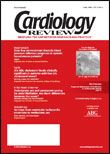Implantable cardioverter-defibrillator therapy for a woman with nonischemic cardiomyopathy
A 40-year-old previously healthy woman had progressively worsening dyspnea on exertion and lower extremity edema for a duration of 4 months.
A 40-year-old previously healthy woman had progressively worsening dyspnea on exertion and lower extremity edema for a duration of 4 months. She had no history of chest pain, atrial fibrillation or other tachyarrhythmia, recent viral illness, alcohol or drug abuse, medication use, or pregnancy. Her vital signs were normal, and she had normal jugular venous pressure, clear lung fields, displaced point of maximum impulse, regular heart rate and rhythm without murmurs, absent S3, and 1+ pitting lower extremity edema to the level of the knees. Her electrocardiogram showed normal sinus rhythm, with no ST- or T-wave abnormalities and no Q waves. Her chest x-ray showed cardiomegaly. Her transthoracic echocardiogram showed decreased left ventricular systolic function, with an ejection fraction of 25% to 30% and increased left ventricular size. Cardiac catheterization showed nonsignificant coronary artery disease, elevated left-sided heart pressures, and decreased cardiac output, which indicated there was no ischemic cause for the cardiomyopathy. After excluding reversible causes of cardiomyopathy, idiopathic nonischemic cardiomyopathy was diagnosed.
Because survival benefit has been shown in subjects with nonischemic cardiomyopathy who receive an implantable cardioverter-defibrillator (ICD) in addition to standard medical therapy, a beta blocker and an angiotensin-converting enzyme inhibitor was prescribed, and information regarding risk of sudden cardiac death was discussed with the patient. The patient agreed to placement of an ICD.
